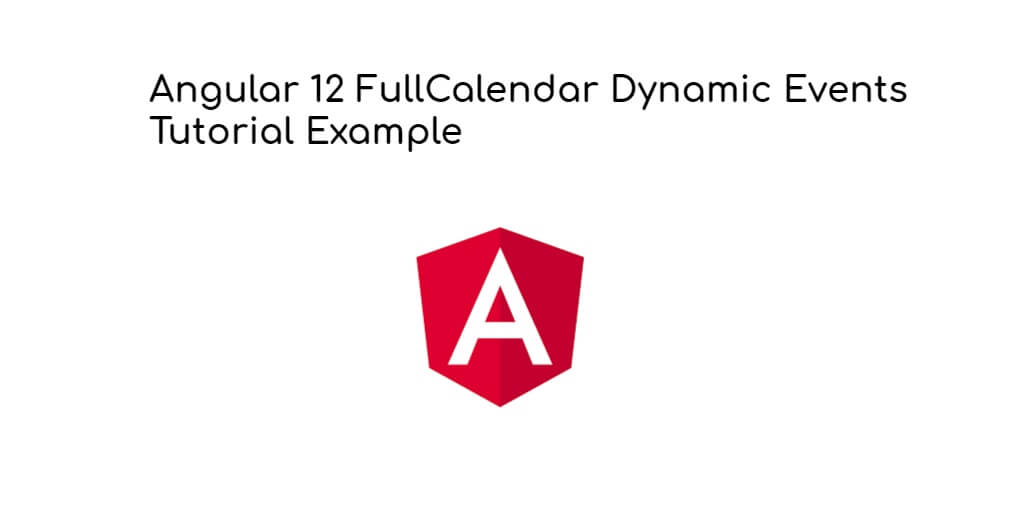angular fullcalendar integration with dynamic events example. In this tutorial, you will learn step by step how to integrate fullcalendar in angular 11/12 app and display dynamic data or events in fullcalendar.
This tutorial guide will help you step by step on how to display dynamic data on fullcalendar in angular 12 app.
Create and Display Dynamic Events with FullCalendar in Angular 12
Follow the following steps and integrate and create dynamic event fullcalendar in angular 12 app:
- Step 1 – Create New Angular App
- Step 2 – Install FullCalendar Library
- Step 3 – Add Code on App.Module.ts File
- Step 4 – Add Code on View File
- Step 5 – Add Code On app.Component ts File
- Step 6 – Create Dynamic Events in Angular
- Step 7 – Start the Angular App
Step 1 – Create New Angular App
First of all, open your terminal and execute the following command on it to install angular app:
ng new my-new-app
Step 2 – Install FullCalendar Library
Then install NPM package called @fullcalendar/angular for implement fullcalendar in angular 11 app. So, You can install the packages by executing the following commands on the terminal:
npm install @fullcalendar/angular npm install @fullcalendar/daygrid npm install @fullcalendar/interaction
Step 3 – Add Code on App.Module.ts File
In this step, visit src/app directory and open app.module.ts file. And then add the following lines of into app.module.ts file:
import { NgModule } from '@angular/core';
import { BrowserModule } from '@angular/platform-browser';
import { AppRoutingModule } from './app-routing.module';
import { AppComponent } from './app.component';
// import modules
import { HttpClientModule } from '@angular/common/http';
import { FullCalendarModule } from '@fullcalendar/angular';
import interactionPlugin from '@fullcalendar/interaction';
import dayGridPlugin from '@fullcalendar/daygrid';
FullCalendarModule.registerPlugins([
interactionPlugin,
dayGridPlugin
]);
@NgModule({
declarations: [
AppComponent
],
imports: [
BrowserModule,
AppRoutingModule,
FullCalendarModule,
HttpClientModule
],
providers: [],
bootstrap: [AppComponent]
})
export class AppModule { }
Step 4 – Add Code on View File
In this step, create fullcalendar in angular 11 app. So, visit src/app/ and app.component.html and update the following code into it:
<div class="container"> <full-calendar [options]="calendarOptions"></full-calendar> </div>
Step 5 – Add Code On app.Component ts File
In this step, visit the src/app directory and open app.component.ts. Then add the following code into component.ts file:
import { Component } from '@angular/core';
import { HttpClient } from '@angular/common/http';
import { CalendarOptions } from '@fullcalendar/angular';
@Component({
selector: 'app-root',
templateUrl: './app.component.html',
styleUrls: ['./app.component.scss']
})
export class AppComponent {
Events = [];
calendarOptions: CalendarOptions;
constructor(private httpClient: HttpClient) { }
onDateClick(res) {
alert('Clicked on date : ' + res.dateStr)
}
ngOnInit(){
setTimeout(() => {
return this.httpClient.get('http://localhost:8888/event.php')
.subscribe(res => {
this.Events.push(res);
console.log(this.Events);
});
}, 2200);
setTimeout(() => {
this.calendarOptions = {
initialView: 'dayGridMonth',
dateClick: this.onDateClick.bind(this),
events: this.Events
};
}, 2500);
}
}
Step 6 – Create Dynamic Events in Angular
In this step, you need to create event.php file and place the following code in the file:
<?php
header("Access-Control-Allow-Origin: *");
header("Access-Control-Allow-Methods: PUT, GET, POST");
header("Access-Control-Allow-Headers: Origin, X-Requested-With, Content-Type, Accept");
$calendarEvents = array('title' => 'Event name', 'start' => '2021-05-10');
echo json_encode($calendarEvents);
Step 7 – Start the Angular App
In this step, execute the following command on terminal to start angular fullcalendar npm app:
ng serve
